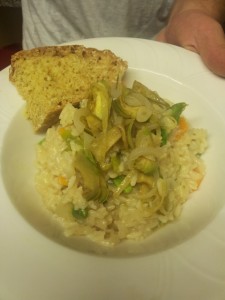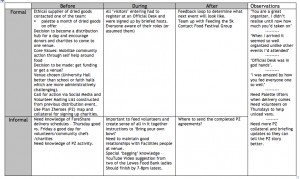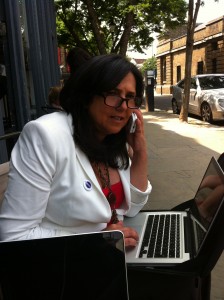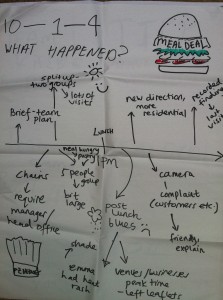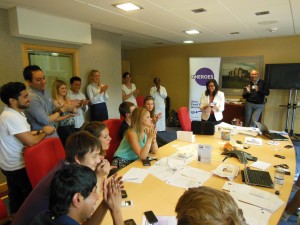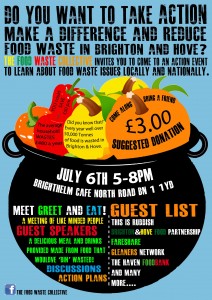Artichokes are a n acquired taste but when you are hungry they are delicious. This is a recipe with basic ingredients: a few determined people, a dash of technology (soon to be enhanced), a sprinkling of generous traders and a huge dose of imagination from the cooks who mixed ingredients.
n acquired taste but when you are hungry they are delicious. This is a recipe with basic ingredients: a few determined people, a dash of technology (soon to be enhanced), a sprinkling of generous traders and a huge dose of imagination from the cooks who mixed ingredients.
Week One: from small beginnings – 5 traders, 1 charity (Dragon’s Cafe)
After a little bit of encouragement from Charlotte Jarman (an Anthropolgist project manager of FoodSave project at Sustain who has helped to develop tourism projects with coffee-growing communities in Peru and Tanzania), aided and abetted by Plan Zheroes, London’s Borough Market adopted the idea of making surplus food donations.
The scheme begain in June and received good local press coverage, here’s what Sustain said: ‘London’s Borough Market sends surplus food for use by a local charity.’
The first week’s donations got a lot of publicity including London SE1 Community Website. One of its reader’s, Abi Todd got in touch:
Hi Plan Zheroes
I read the article on SE1 about linking up food from Borough Market with the Dragon Café. Your work sounds amazing and I would love for us to get involved.
I manage a young people’s hostel for 116 vulnerable people aged 16-21 in Borough. We are making frequent use of Food Banks and I would be really interested in investigating if we can link with local food suppliers to supplement this. many of our young people are sanctioned for long periods of time, and food poverty and poor nutrition are rife.
The organisation I work for is Look Ahead Care and Support www.lookahead.org.uk , and I attach our service leaflet so you can see a little of what we do.
Do get in touch if you think we could work together on this.
So we did! We asked Abi to create a profile on the Plan Zheroes map, sign the charity agreement and connected her with Charlotte at Sustain; one week later they were ready to collect surplus food.
Week Two: ‘exit the Dragon’ (temporarily); enter Look Ahead
With the Dragon Cafe unable to receive a donation Look Ahead steps in. By now word has spread and volunteers appear from Plan Zheroes and Sustain to help collect and distribute the surplus food. 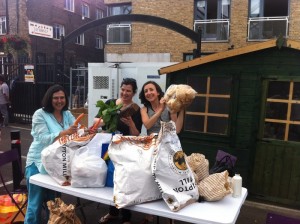
Jacopo of Plan Zheroes weighs donations and we record details, the volunteers from Look Ahead pack it and take it to the charity. Charlotte (of Sustain) registers donations week by week, so we all have an idea of what and how much is being donated.
There was much more food to take 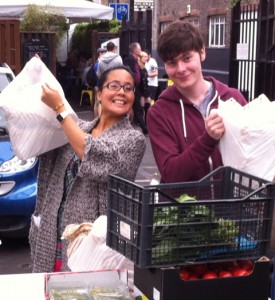 and Jaqueline from Look Ahead, came with one young person and one (very) big bag… luckily they also had money to call a taxi!
and Jaqueline from Look Ahead, came with one young person and one (very) big bag… luckily they also had money to call a taxi!
At the donation collection point, we had a surprise: an unusual donation of artichokes. Jaqueline’s face, was a picture: we wondered if she knew how to cook and eat Artichokes… and secretly Jaqueline was already wondering if the young people they help would like it!
We raised the issue her face had betrayed and Jaqueline shared they run a weekly “Masterchef’ session, wondering if we would be able to run one with them for the Artichokes?! Abi replied again:
On Thursdays we run “masterchef” sessions where staff or young people run cooking sessions. It’s a really well established feature of our week at Gateway and your support with making use of donations would be really appreciated.
Week Three: Masterchef Ivan and the Artichokes class
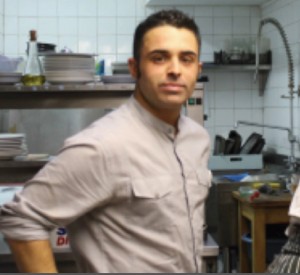 Of course the next step was to engage Ivan Cubillo – a Zheroes Volunteer, who is a professional chef and just graduated as Nutritionist, here is what he said:
Of course the next step was to engage Ivan Cubillo – a Zheroes Volunteer, who is a professional chef and just graduated as Nutritionist, here is what he said:
“Artichokes are a bit tricky but once you know what to do with them are delicious!! I know few tricks to cook them with not much hussle.”
So now everything is set up, Ivan is running a MasterChef session on Artichokes.
And the story has a happy ending:
We now have to wait and see when Ivan goes to Look Ahead – Gateway for the Masterchef. Meantime over 150kgs of food was prevented from waste, and 180 young people have access to delicious food from their very local Borough Market!
Back to Abi who confirmed inter alia that:
We can definitely commit to Saturday collections over the Summer. We could handle more – mostly so far we’ve just been giving it straight out to residents, who have been cooking it themselves, but there is a fair bit of scope for us doing communal cooking activities as well. (Ivan is coming on Friday to meet me to discuss)
The veg fits in well with our ‘Healthy Conversations’ programme which is all about encouraging better lifestyles and choices, so we are happy to facilitate as much healthy stuff coming into Gateway as possible.
I counted 7 pallets yesterday, and we also had about 4 cardboard boxes.
The role of a food knowledge broker is never dull and once the wonderful new mobile application is launched from next month, thanks to our friends at Keytree who have given us massive support, we at Plan Zheroes will be able to do so much more and help make much better use of surplus food. Here’s a sneak preview of how a conversation between a donor and a recipient might go:
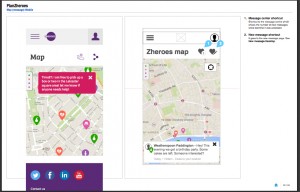 Even if you can’t help with effort as a volunteer or food as a donor you will be able to by making a financial contribution. Plan Zheroes is a registered charity and like all not for profit organisations we need funds to keep afloat. Thanks for reading this and watch this space for the results of the Masterchef session.
Even if you can’t help with effort as a volunteer or food as a donor you will be able to by making a financial contribution. Plan Zheroes is a registered charity and like all not for profit organisations we need funds to keep afloat. Thanks for reading this and watch this space for the results of the Masterchef session.
Now that’s what I call an imaginative use of Artichokes – Risotto Primavera:
Here is Ivan’s account of his MasterChef class
Today it was a good day at Look Ahead. The participants showed commitment and good attitude troughout the session. Tommy who works at Look Ahead helped wonders and it was a fun person to be around. Soda bread was a huge success and although we had to tweak the recipe a little bit, the result was amazing! On Monday, the charity received/collected asparagus, broad beans, spring onions, kale, broccoli and (as Tommy said) “lopads” of carrots. With such as a good variety of produces the choice was obvious: Risotto Primavera! After frying the onions and garlic we add some carrots chopped up nicely. Then we add our rice (no rissotto rice? No Problem!) Tesco did not have risotto rice so we end up using long grain rice (Challenged accepted!). Once we add the rice we started stirring our rice to release all the starch…adding slowly our lovely beef stock was next (Thanks stock cubes!) and when our rice was almost done we added the broad beans and asparagus (they were previously blanched) and finished the rissotto with butter and cheddar cheese (parmigiano a bit too expensive for our budget). And the Artichokes? Well, we almost forgot the artichokes! (Here is where the Chefs skills come in handy) Quickly we peeled a couple of them, thinly sliced them and sauteed them with garlic and onions, we add a bit of water until they were nice and soft. The par-roasted artichokes looked delicious on top of our rissotto and the guys in the workshop loved them. Overall, great experience in Borough Road, people loved me (no wonder!) and I loved them, so “this could be beginning of a beatiful friendship”.
Best,
Ivan

